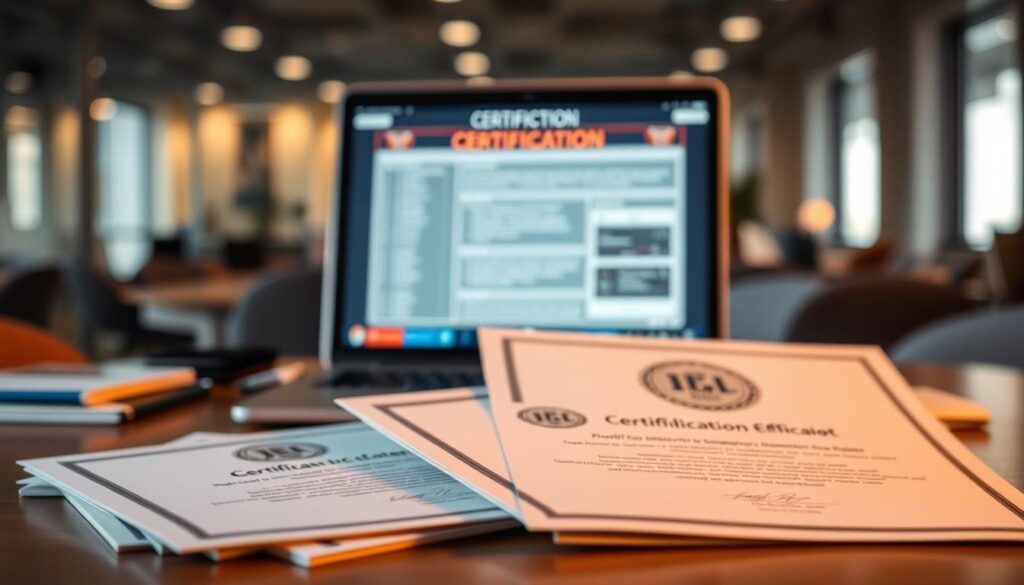Remember that moment when a new software update disrupted your entire project timeline? Or when a colleague casually mentioned a tool you’d never heard of? In our field, technical landscapes shift faster than ever – what worked yesterday might not work tomorrow. That sinking feeling of falling behind isn’t just personal; it’s professional.
Modern systems engineering demands more than textbook knowledge. Whether you’re optimizing manufacturing workflows or designing aerospace components, your value grows with your ability to adapt. This reality hits hard: 84% of hiring managers now prioritize analytical thinking, while Python/Java proficiency boosts employability by 30% (Bureau of Labor Statistics).
This guide gives you practical ways to build essential skills for systems engineers across industries. You’ll discover how to:
- Identify emerging technologies impacting your sector
- Balance technical depth with big-picture business goals
- Streamline skill development using smart tools
Tools like RoboApply’s AI-powered resume builder help showcase evolving expertise. Teams using structured learning approaches achieve 28% better project outcomes (Project Management Institute) – proof that strategic growth pays off.
Key Takeaways
- Technology shifts make ongoing skill development non-negotiable
- Cross-industry demands require adaptable technical expertise
- Analytical thinking tops employer priority lists
- Certifications like INCOSE CSEP validate specialized knowledge
- AI tools accelerate both learning and career advancement
Introduction to Continuous Learning in the Engineering Field
Imagine designing a medical device that suddenly needs IoT integration, or optimizing an automotive assembly line for AI-driven quality control. Modern engineering roles demand skills that didn’t exist five years ago. Staying relevant means treating education as a career-long journey, not a one-time milestone.
The Importance of Lifelong Learning in Technology
Tools like MATLAB evolve yearly, while cloud platforms introduce new features monthly. A 2023 IEEE study found engineers who complete quarterly training reduce project delays by 41%. Platforms like Coursera offer micro-courses tailored to industry shifts, letting you master trends like digital twins or edge computing.
Overview of Systems Engineering Challenges and Opportunities
From aerospace to renewable energy, systems professionals face unique hurdles. Healthcare projects require FDA compliance expertise, while manufacturing demands lean Six Sigma methods. Why upskilling matters becomes clear when tackling cross-sector demands.
Forward-thinking organizations now reward certifications like PMP or INCOSE CSEP. Webinars from groups like SA International provide sector-specific insights, while skill gap analysis tools help prioritize learning goals. Specializing in niche areas like cybersecurity for industrial IoT can triple consulting rates.
Continuous Learning for Systems Engineers: Tools and Best Practices
How many times have you revised a resume only to hear nothing back? Modern engineering roles demand more than technical expertise – they require smart presentation of your skills. RoboApply’s suite addresses this gap with precision.

Showcase Skills with AI-Driven Resumes
RoboApply’s AI resume builder transforms project documentation into recruiter-ready profiles. The tool analyzes job descriptions, suggests relevant keywords, and formats complex systems diagrams for clarity. One aerospace engineer reported 63% more interview requests after optimizing their LinkedIn summary through the platform.
Streamline Job Search Processes
Three features revolutionize career management:
- ATS Optimizer: Ensures resumes pass automated screenings by checking keyword density and layout compliance
- Outreach CRM: Tracks applications across 50+ job boards and schedules follow-up reminders
- Skill Mapper: Aligns your training history with emerging software requirements in target industries
These tools create a feedback loop: applications inform skill gaps, which guide learning priorities. For deeper strategies, this career development guide explains how to document certifications effectively.
Adopting such solutions cuts job search time by 40% (2024 TalentBoard data). Whether pursuing digital transformation roles or specialized positions, structured approaches prevent missed opportunities. Set weekly application goals using RoboApply’s tracker – visibility drives accountability.
Essential Skills and Strategies for Technical Growth
Technical expertise alone won’t cut it in today’s engineering landscape. You need frameworks that turn knowledge into actionable solutions while bridging gaps between technical teams and business objectives.
Building Strong Technical Proficiency and Problem-Solving Skills
Master tools like Ansys or MATLAB to simulate real-world scenarios. One automotive engineer reduced prototype failures by 57% after creating digital twin models that predicted thermal stresses. Break complex problems into modular components using root cause analysis templates.
Develop troubleshooting playbooks that combine:
- Failure mode databases from past projects
- Automated error pattern recognition scripts
- Cross-validation checklists for team reviews
Fostering Cross-Disciplinary Collaboration and Innovation
Translate technical jargon into business impacts during stakeholder meetings. A medical device team accelerated FDA approvals by creating visual workflow diagrams that non-engineers could easily validate.
Use iterative feedback loops to align testing schedules with marketing timelines. Implement weekly “solution swap” sessions where mechanical and software teams present challenges in plain language.
Tools like skills-based resume builders help showcase your ability to merge technical depth with cross-functional leadership. Track emerging technologies through curated industry newsletters while maintaining core competency in legacy systems.
Leveraging Professional Development and Certifications
What separates competent engineers from industry leaders? Often, it’s the credentials that validate expertise. Strategic certification choices demonstrate mastery while opening doors to advanced roles.

Understanding the Value of Certifications like CSEP and PMP
The INCOSE CSEP certification proves you can design complex systems meeting strict industry standards. With a 5-year experience requirement, it’s trusted by aerospace and automotive employers for senior roles. One defense contractor reported 22% salary bumps for CSEP holders during promotions.
PMP certification bridges technical and leadership gaps. Its focus on risk management and team coordination helps engineers transition to project director positions. Studies show PMP-certified professionals complete initiatives 35% faster than non-certified peers.
Engaging with Webinars, Conferences, and Online Courses
Platforms like Coursera offer nano-degrees in emerging areas like quantum computing applications. Attend virtual summits hosted by IEEE to discover tools reshaping energy grids or medical devices. These events often provide free certifications for completing workshops.
Prioritize training that solves current workplace challenges. If your team adopts new CAD software next quarter, find vendor-led courses with hands-on simulations. Track progress using digital badges from credible organizations – they’re easily shareable on LinkedIn.
Networking at conferences yields unexpected opportunities. An automotive engineer landed a consulting gig after discussing battery thermal management solutions during a SAE International coffee break. Always bring business cards – even virtual ones.
Enhancing Career Prospects with Digital Transformation
How often does your company adopt new tech solutions? Digital transformation reshapes engineering roles faster than most professionals realize. Mastering these changes requires strategic tool adoption and intentional skill-building.
Embracing Digital Tools and Software Technologies
Cloud-based platforms like AWS for simulation or AI-assisted design tools like Autodesk Fusion 360 are now industry standards. One automotive team reduced prototyping costs by 39% using automated testing systems. Prioritize tools that solve immediate workflow bottlenecks while preparing for IoT integration demands.
Build competency through vendor certifications and hands-on labs. Platforms like Udacity offer project-based courses in machine learning applications for hardware systems. Pair these with future-proof career strategies shared by industry leaders.
Integrating Internal Training Programs and Linking to Resources
Most organizations provide LMS platforms with proprietary training modules. Supplement these with external certifications addressing gaps in areas like cybersecurity or data analytics. For example, Microsoft’s Azure IoT Hub training complements in-house safety protocols for industrial systems.
Track progress using skills-based resume templates that highlight both company-sponsored education and self-driven initiatives. Set quarterly goals to explore one emerging technology through webinars or sandbox environments.
Successful engineers balance tool mastery with business impact. Regular skills audits ensure your expertise aligns with market shifts while maintaining core engineering competencies. Stay curious – subscribe to niche newsletters like Edge Computing Weekly for actionable insights.
FAQ
How do certifications like CSEP or PMP enhance a systems engineer’s career?
Certifications validate expertise in industry standards like INCOSE or PMI frameworks, making professionals more competitive. They demonstrate commitment to staying current with methodologies, which employers value for leadership roles and complex projects.
What tools help systems engineers streamline job applications?
RoboApply’s AI-powered resume builder optimizes content for ATS compatibility, while its Outreach CRM automates follow-ups with hiring managers. These tools reduce manual effort and improve visibility in competitive job markets.
Why is cross-disciplinary collaboration critical in modern engineering?
Projects increasingly require integration of software, hardware, and business processes. Collaborating with data scientists, UX designers, or cybersecurity experts ensures solutions address technical and operational needs holistically.
How can engineers stay updated on emerging technologies like AI or IoT?
Attend IEEE conferences or AWS webinars, enroll in Coursera’s specialized courses, or join forums like Engineering.com. Pairing formal education with hands-on experimentation accelerates practical understanding.
What strategies bridge skill gaps during digital transformation?
Combine internal training programs (e.g., Siemens’ MindSphere workshops) with certifications in cloud platforms like Microsoft Azure. Use tools like Jira or Trello to manage upskilling goals alongside project deadlines.
How do webinars and online courses differ from traditional training?
Platforms like Udacity or LinkedIn Learning offer flexible, on-demand access to niche topics like DevOps or Model-Based Systems Engineering (MBSE). This lets engineers learn at their pace without disrupting workflow.
Why focus on problem-solving skills in technical growth?
Complex systems require engineers to troubleshoot issues like integration failures or scalability bottlenecks. Structured approaches like Six Sigma or Agile methodologies turn abstract challenges into actionable solutions.


















